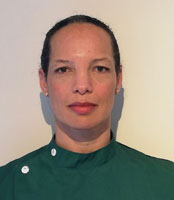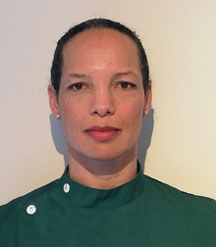
Dr. Heather Manning

Dr. Heather Manning
When I moved to England on a snowy day in 2013 to start a new job in a West Midlands small animal clinic, I was a seasoned practitioner with nearly 14 years of experience working as a veterinarian in the United States. However, I quickly realized that for all my confidence working in companion animal medicine, I had a lot of learning to do when it came to acclimating myself to the differences in practice between the U.S. and the U.K. What's the prescribing cascade? Sedation for taking X-rays is routine? I have only 10 minutes for an exam?!
Discovering that an animal that’s "sick" isn’t just ill but has been vomiting; learning what procedures registered veterinary nurses could and couldn't do; figuring out U.K. names for medications I wanted to prescribe; and getting to grips with the Royal College of Veterinary Surgeons' Code of Conduct added new levels of anxiety to my days. I often left work feeling like I'd stepped into the world fresh from vet school again. My learning curve was vertical and my stress levels soared.
To add to my feelings of uncertainty, I was thousands of miles away from family or friends other than my partner, and my job kept me busy enough that I was too tired to go to social functions where I might have hoped to create a new social circle. I vowed to myself that I would stay three years and no longer.
If you read the research articles and opinion pieces published in veterinary journals and online forums over the past 10 years or so, you're acutely aware of the discussion surrounding mental well-being in our profession.
Our veterinary news sources remind us on a weekly and monthly basis that we have suicide rates higher than that of the general population. We self-medicate and engage in risky behaviors in an apparent effort to reduce the stress we experience in our jobs. Some of us leave the profession; others switch to career tracks that accommodate our lifestyles better, while many others stay in roles that slowly grind us down while we quietly suffer.
The concerns about mental well-being are by no means confined to North America. The U.K. has identified the problem of poor mental health in the veterinary profession for some time (see, for example, a study published in 2009 by David Bartram et al.). However, there is a cohort of veterinarians, or veterinary surgeons as we’re referred to here, that’s sometimes overlooked in the effort to address the problem.
The proportion of foreign-born veterinarians working in government and private practice in the U.K. is substantial. Figures provided by the RCVS suggest that as many as one-fifth of the U.K.’s working veterinary surgeons hold European Union diplomas. And that number doesn’t take into account veterinarians working in the U.K. from non-EU countries such as Australia, Canada, South Africa, India, former U.K. colonies in Africa and the West Indies, and the United States.
Living in a large, diverse metropolitan city in the U.K., I’ve had the pleasure of working with a number of veterinary surgeons from around Europe. Colleagues from Italy, Germany, Romania, Hungary, Spain and Poland have all passed through our clinic. These are ambitious individuals with plans to make their home in the U.K., which in terms of career progression and working conditions, is considered one of the best in Europe for veterinarians.
A great number of EU graduates commence work in the U.K. as "Official Veterinarians" working for the government in positions inspecting and protecting the production of the nation's food supply. Those vets often start at salaries much higher than they could hope to earn in their home countries, with opportunities to advance in their roles. Some practitioners use such a position as a springboard for moving into private clinical practice or even business ownership.
But when these veterinarians arrive on the shores of the U.K., they frequently encounter a unique set of challenges that can require extraordinary levels of commitment to prosper here.
While foreign-born veterinarians are positioning themselves to take advantage of what the U.K. market can offer them, they must cope not only with the daily pressures of the job but the additional demands of language barriers, social isolation, xenophobia and a rigorous regulatory system that often doesn’t exist in the countries they trained in.
A veterinarian from Spain was surprised to learn that he could be permanently removed from the registration rolls if the Royal College of Veterinary Surgeons determined he’d breached the standards governing malpractice or negligence. Knowing just what constitutes such a breach of professional responsibility can be tricky if you haven’t been held similarly accountable in your own country.
In polling some of my fellow expatriate veterinarians, the issue of client communication arose frequently. One woman voiced her frustration that clients felt she lacked adequate professional expertise simply because she spoke with an accent and clearly wasn’t native-born. The clientele equated her accent with substandard schooling. This, despite the fact that clients could clearly comprehend what the veterinarian was telling them, and she could obviously understand what was being said to her.
For those veterinarians who speak English as a second or sometimes third language, the consult room is littered with opportunities to make errors. The Veterinary Defence Society, a body in the U.K. that defends veterinarians when a complaint is lodged against them, has found that communication difficulties form the basis for many of the client complaints brought against foreign-born veterinarians.
Other countries pose their own challenges for outsiders. A fellow American who worked as a veterinarian for a time in Sweden voiced her dismay at not being able to establish the sort of friendly rapport with her Swedish clients that she slid into naturally in the U.S. She also found it difficult to make friends with the local population, as the culture was much more reserved than she was accustomed to. That, the significantly lower pay for veterinarians, and the dreary Northern European winters finally forced her to return to the United States.
While the U.K. shares chilly winters with Northern Europe and comes in fifth in terms of veterinary salaries behind France, Spain, the Netherlands, and the U.S., it still offers significant opportunities for foreign-educated veterinarians to live and work here while establishing families and putting down roots.
My case illustrates this point. My civil partner is French and has the legal right to live and work in the U.K. (for now, at least). France will not recognize graduates of non-EU veterinary schools unless a number of stringent requirements are met. However, the U.K. grants family members of EU citizens (including civil partners) the right to work in the U.K., and I profit from reciprocity when it comes to my veterinary diploma being accepted by the RCVS.
Since our civil partnership isn’t recognized by the United States, obtaining a visa for my partner to live and work there would have been costly and complicated. So we plumped for the U.K. as a reasonable compromise. In the time I’ve worked here, we’ve purchased an apartment, had a son, and become involved in community organizations.
Another wrinkle is the uncertainty surrounding the outcome of Brexit. While politics doesn’t usually play a big part in the day-to-day decisions someone might make about where to live and work, for foreign-born vets working in the U.K., it must be considered if they hope to plan for longer than the next two years. Do you commit to a practice purchase if you don’t know if you’ll be allowed to remain after 2021? Do you start an advanced training program or take out a mortgage on a home? These are important life decisions that affect not just the veterinarians making them but their employers, spouses, partners and children. By extension, the entire veterinary industry in the U.K. will depend on the responses to these questions.
Even non-EU veterinarians may be affected by Brexit if their right to remain in the U.K. is dependent upon an EU family member exercising his or her right to free movement within the countries that are currently members of the European Union. Time moves swiftly. March 29, 2019, the date when the U.K. officially leaves the EU, might as well be tomorrow.
But not all is doom and gloom. Within a profession straining to reclaim enjoyment in practice and reduce its mental health woes resides this untapped population that has voluntarily placed itself directly in the path of uncertainty and change, yet managed to find its footing. Foreign-born veterinarians draw upon innate and learned skills in adaptability, self-care, resourcefulness, and self-reflection to survive in a strange land. From there, they craft lives that allow many of them to have successful careers both in the U.K. and their home countries when and if they choose to return. These same competencies could benefit the profession as a whole and can be taught in settings such as at continuing education meetings and externships, and through mentorships.
Six years on, I still hold the same job at the same clinic I started at in the West Midlands. I’ve adjusted to the cultural and professional differences that seemed so monumental over half a decade ago, and I’ve grown a network of friends and colleagues who provide support and relief from the daily rigors of the job. Most of the foreign-trained veterinarians I know have done the same. When designing programs and systems to alleviate the mental stresses faced by all of us in our roles as veterinary professionals, I urge people to consider the extra difficulties faced by foreign-born practitioners and to harvest their skills in resilience and adaptability, honed in the face of much stress, as another resource that can help us all.
Heather Manning, DVM, MRCVS, is a 1999 graduate of the University of California, Davis, School of Veterinary Medicine. Early in her career, she worked as an equine and small animal practitioner in California's Sierra Nevada foothills, then went on to do relief work until taking a one-year sabbatical to travel the world. While traveling, she met her current partner. Together, they have lived in Bordeaux, France; Seattle, Washington; and Birmingham, England. Dr. Manning now works as a deputy clinical director of a small animal clinic in Birmingham, where she divides her time between clinical work, managerial duties and mentoring younger (often foreign) veterinarians.